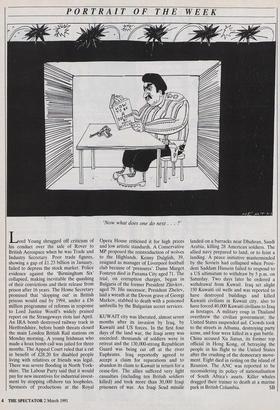PORTRAIT OF THE WEEK
`Now what does one do next . . . ?'
Lord Young shrugged off criticism of his conduct over the sale of Rover to British Aerospace when he was Trade and Industry Secretary. Poor trade figures, showing a gap of £1.23 billion in January, failed to depress the stock market. Police evidence against the 'Birmingham Six' collapsed, making inevitable the quashing of their convictions and their release from prison after 16 years. The Home Secretary promised that 'slopping out' in British prisons would end by 1994, under a £36 million programme of reforms in response to Lord Justice Woolf's widely praised report on the Strangeways riots last April. An IRA bomb destroyed railway track in Hertfordshire, before bomb threats closed the main London British Rail stations on Monday morning. A young Irishman who made a hoax bomb call was jailed for three months. The Appeal Court ruled that a cut in benefit of £28.20 for disabled people living with relatives or friends was legal. There was severe flooding in North York- shire. The Labour Party said that it would pay for new incentives for industrial invest- ment by stopping offshore tax loopholes. Sponsors of productions at the Royal Opera House criticised it for high prices and low artistic standards. A Conservative MP proposed the reintroduction of wolves to the Highlands. Kenny Dalglish, 39, resigned as manager of Liverpool football club because of 'pressures'. Dame Margot Fonteyn died in Panama City aged 71. The trial, on corruption charges, began in Bulgaria of the former President Zhivkov, aged 79. His successor, President Zhelev, laid a wreath at the Devon grave of Georgi Markov, stabbed to death with a poisoned umbrella by the Bulgarian secret services.
KUWAIT city was liberated, almost seven months after its invasion by Iraq, by Kuwaiti and US forces. In the first four days of the land war, the Iraqi army was encircled: thousands of soldiers were in retreat and the 130,000-strong Republican Guard was being cut off at the river Euphrates. Iraq reportedly agreed to accept a claim for reparations and to abandon its claim to Kuwait in return for a cease-fire. The allies suffered very light casualties (including ten British soldiers killed) and took more than 30,000 Iraqi prisoners of war. An Iraqi Scud missile landed on a barracks near Dhahran, Saudi Arabia, killing 28 American soldiers. The allied navy prepared to land, or to feint a landing. A peace initiative masterminded by the Soviets had collapsed when Presi- dent Saddam Hussein failed to respond to a US ultimatum to withdraw by 5 p.m. on Saturday. Two days later he ordered a withdrawal from Kuwait. Iraq set alight 150 Kuwaiti oil wells and was reported to have destroyed buildings and killed Kuwaiti civilians in Kuwait city, also to have forced 40,000 Kuwaiti civilians to Iraq as hostages. A military coup in Thailand overthrew the civilian government; the United States suspended aid. Crowds took to the streets in Albania, destroying party icons, and four were killed in a gun battle. China accused Xu Jiatun, its former top official in Hong Kong, of betraying the people in his flight to the United States after the crushing of the democracy move- ment. Eight died in rioting on the island of Reunion. The ANC was reported to be reconsidering its policy of nationalisation of South Africa's assets. Killer whales dragged their trainer to death at a marine park in British Columbia. SB


















































 Previous page
Previous page